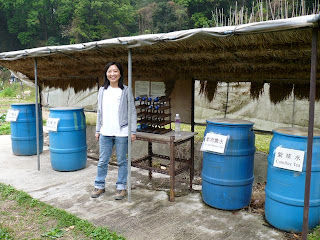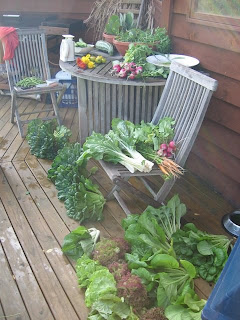 A few days after my visit to Apple and Jo's farm, I headed out to Produce Green which is an NGO that runs an organic farm, education centre and allotment system. Doris (left), who I met at the Hong Kong Flower Show, kindly took me out to her allotment and showed me around.
A few days after my visit to Apple and Jo's farm, I headed out to Produce Green which is an NGO that runs an organic farm, education centre and allotment system. Doris (left), who I met at the Hong Kong Flower Show, kindly took me out to her allotment and showed me around.People in Hong Kong lease a patch of ground (Doris' two square metres costs $300/year) in which they can grow organic vegetables. Produce green provides them with tools, fertilisers, mentors, and watering for when you are not there. Seeds and seedlings are also for sale.
The really nice thing I noticed was how people knew each other - socialising and giving each other a hand. The "weekend" farmers would often bring their family and friends around and it would be a fun and educational day for all.
The picture (right) shows about 60 allotments!

Speaking with Doris and the resident farmer at Produce Green, I was impressed by the similarities between Australia and Hong Kong (air quality aside!).
People have the same concerns about food, health and the environment - there was talk of carbon footprinting, certification and stress... Farmers also work hard on crop rotation, getting good materials for organic composting, green manures and educating conventional customers into the world of organic produce.
For some reason I thought that things might be different, and although there may only be 70 organic farms in Hong Kong, the level of awareness is high and growing.
